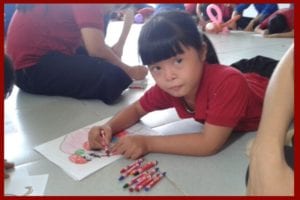
(Originally written Monday 20th April – update soon)
April 2020, was the 8th year anniversary of opening our special school in Dien Ban, Vietnam. During the times of anniversary, myself and the staff usually stop to take a look around us and to express both pleasure and surprise at this wonderful learning environment that together we have created. A place where children run free in the tropical garden, full of joy and self-confidence, where children learn to walk, to communicate, and to manage their daily lives. I am the one who is usually the most surprised, for having been with Kianh Foundation from the start, I know firsthand all of the challenges and obstacles we have had to come through to get here. From the time when the orphanage we worked at knocked down our physiotherapy room without informing us, thus halting our physio programme; to the time when we could not get any official agreement on building our school and progress stalled for a whole year. My colleague and I sat in our office in Vietnam, wondering if this was the time to just pack up and go home?
But Covid 19 was a new challenge. Being so close to China, the virus hit Vietnam earlier than many places in the world and we were told we could not re-open our school after the Tết (Lunar New Year) holiday that had commenced in January. After a series of crisis meetings, and waiting impatiently to be told the school could re-open; I became increasingly concerned about how we could explain to our donors that we were closed because of something ‘not any worse than the Flu’’. As time passed, we decided that we could not delay actioning temporary measures any longer and must come back to work. The staff came to the school every day to make resources and do lesson plans. They have probably now planned enough lessons and made enough resources to last the next five years. Finally, came acceptance. As the global pandemic spread, we realised that this wasn’t ‘just the flu’ and it wasn’t going to be resolved quickly. But how to continue some kind of programme for our kids? Many of our students have Autism, ADHD or moderately severe cognitive disabilities. Despite knowing that this would be a very difficult thing to achieve and that it was unlikely they could get many of our students to sit in front of a computer, or probably phone, screen at home and pay attention, I told our staff that they should get some kind of distance learning underway with the kids.
Full kudos to our staff who took my request and made it work. They knew that it was not really likely that they would be able to teach our kids this way, and decided instead to teach the parents. Each week they would share a simple goal of their child with a family, give guidance on how to help the child achieve it, and then the family would send back video footage (usually just something very simple from their phone) of them working with the child, for feedback and review from the teacher or therapist. This strategy is working better than I could have hoped, and it is a joy to see the videos that are shared with me each week. Some of the families are really going the extra mile. One family has painted a walking track in their large backyard, to help guide the walking of their son who has Cerebral Palsy. Another family who has a child with Cerebral Palsy, have made parallel bars out of bamboo for him to practice in the garden. One mother is teaching her child her numbers, whilst also incorporating verbalisation and sign language in the lesson. It’s a dream of a lesson that any western speech therapist would be happy to conduct! Of course, not all of the sessions run like this, and many of the parents need a lot of feedback and guidance. But that is fine. The point is that they are thinking about their child’s development and are learning how to bring it about themselves. As all special ed. teachers around the world will know, getting the parents on board is often a large part of the battle. Families are too tired, don’t have enough time, find what is requested of them too difficult; as the mother of a child with Cerebral Palsy, I know all too well the barriers to working with your child at home, and what you are just too tired to do, even though you know you should be doing it. But here are our families, quarantined at home with their children, not allowed to go to work. They have the time to put some effort into this, and the more of these home videos I see, the more I realise that out of difficult circumstances, a golden opportunity has arisen.
So although this particular Kianh anniversary has been a strange one, I cannot call it a wholly bad one. We missed our school. We missed seeing our students every day. But it is gratifying to know that the Kianh Foundation school, is more than bricks and mortar, and those involved can bring about learning anywhere, and in any circumstances. If Vietnam teaches you anything, it teaches you resilience and flexibility, and this is what I am seeing in our staff, students and families now.
Jackie Wrafter M.B.E

